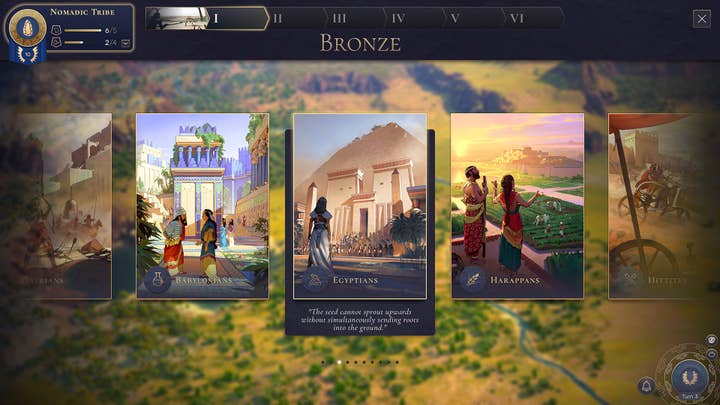Charting the darker periods of history in Humankind
Amplitude's Jeff Spock on creating a historical strategy game that doesn't shy away from religion, slavery and colonisation
Humankind is not the first strategy game to offer players a journey through our society's entire history, but it's attempting to be the most innovative.
The upcoming title is in development at Sega's Amplitude Studios and represents the team's first foray into the real world, having previously developed sci-fi 4X strategy series Endless Space and its fantasy off-shoot Endless Legend.
In Humankind, players guide a civilization from the Stone Age to the Space Age -- again, not an uncommon premise for the genre -- but each time they reach a new era, they can swap the civilization they control (for example, transforming their virtual empire from Ancient Egyptian to Roman).
This shakes up the gameplay in ways genre fans might not expect (more on that later), but also represents the evolution of human society. After all, each nation is by now the product of a myriad of different cultures and influences, whether from those that have immigrated peacefully or as a consequence of invasion and colonisation.

This is a concept Amplitude hopes to explore further, hinting that religion and ideology will also play a part in how your digital culture evolves -- although narrative designer and lead writer Jeff Spock acknowledges this potentially opens the studio to a "lose, lose situation."
"The number of things you can list in human history that are dangerous, like colonisation, slavery, authoritarian regimes, mass displacement... you know there's so many topics that are logical hot buttons for entire nations, civilisations, cultures, peoples," he tells GamesIndustry.biz. "The thing is, from our point of view, if you're going to make a game that pretends to be about human history, you can't avoid this.
"On the other hand, if you put it in your game, you're going to get yelled at. No matter what you do, and how sensitive you are, there's someone who'll think it's too sensitive and someone who'll think it's not sensitive enough. It's just something we're going to have to deal with, as grown ups, and as game developers and as responsible games developers.
"If you avoid these questions, you're avoiding things that we think mass market entertainment IP ought to address, to put out on the table and discuss. And so we're going to go there with baby steps."
Spock observes that while science fiction novels, for example, have pushed the boundaries of gender, race and other sensitive subjects, games tend to avoid this because of the "very toxic subcultures" around the hobby -- although he acknowledges steps are being taken "and I think have to be taken."
"You're going to get yelled at... No matter what you do, and how sensitive you are"
In the meantime, Amplitude is exploring how it can bring the darker parts of human history into its new game in a way that is more than mechanical. It's not just about how it improves a player's statistics or score, but how it impacts the way their society evolves.
"Clearly we don't want to say, 'Hey, slavery, really efficient, gets that industry cap up,' that's not what you want to do," says Spock. "But sadly that's why it existed. How do you balance that? How do you make that choice? What gameplay social consequences vs industrial political consequences do you try to build in?
"We're not going to answer these questions right, we may not answer them enough, but at least we're trying for all these things."
There's the added complication of not knowing how certain players will use the tools a game gives them to act out their own beliefs. Rockstar naturally included Suffragettes in Red Dead Redemption II for historical accuracy, yet this enabled anti-feminists to post videos of them being assaulted in-game. Similarly, CD Projekt Red has acknowledged that the presence of religions in Cyberpunk 2077 could allow a player to target those of a particular faith (although this will not be encouraged in any way by the developer).
These two examples are much more specific than the potential issues Amplitude might face, especially at it tries to encompass the whole of human history, ideology and culture.
"That's really the problem," Spock admits. "The whole idea of diversity and realism, how do you stop a player from being an ogre? And in most strategy games, that's how you build -- by actually exterminating everybody else. Morally, how do you justify that?
"The nuance is in the hand of the player, I suppose, is maybe a way to look at it. And we want to do a nuanced game. We don't control the way it comes out the other end. Yeah, there's risk that is taken when you do that. You have to put it out there and see how the players react, how the press reacts, how Sega reacts. It's a lot easier if it's science fiction, or if it's fantasy, but now we have to face these questions, and you know, we have to face them like grown-ups. It's sometimes not fun."
Amplitude could have easily attempted a game of this scale within either of its Endless series, but the studio was actually founded with the ambition to make a historical strategy game. The ex-Ubisoft team that formed the company were all huge fans of the genre and its leaders such as Civilization. There was just one problem.
"In most strategy games, that's how you build -- by actually exterminating everybody else. Morally, how do you justify that?"
"We'd played them for uncountable hours, but we never actually developed them," says Spock, "so the first thing to do out of the gate as a new studio is not to make a historical 4X... If you're trying to do that against Civilization, it's kind of crazy."
Instead, the team trained themselves up, starting with Endless Space -- much less complex in terms of technical challenge thanks to the simple black background units fought it. With Endless Legend, Amplitude learned to understand 3D terrain and how it affects troop movement and so on. Endless Space 2 introduced more physics and sophisticated trade and diplomacy systems.
Spock assures fans that the Endless games will continue after Humankind because as lead writer on those projects, "I would quit the studio if we're not going to keep doing them -- those games are so much fun for me personally." But the three games were built with the ultimate goal of making Humankind clearly in mind.
"You gotta get to base camp before you climb Mount Everest," Spock says. "[That] is really what the initial games were for."
Everest is a fine comparison. Amplitude has gone from the niche market of sci-fi 4X strategy -- the lack of major titles in that area was a key motivator for Endless Space, Spock says -- to taking on the grand-daddy of the strategy genre: the long-running Civilization series. And, by way of a laboured food analogy, Amplitude expresses confidence that Humankind can stand toe-to-toe with Sid Meier's franchise.

"In terms of stealing their lunches, we have the enormous good fortune to not work in an industry where the size of the pie is fixed," Spock says. "Players keep coming in and that pie just keeps growing. I think there's enough pie for everybody. So it's not like we're trying to knock somebody out or eat somebody's lunch. It's just like you can go Asian, or you can go Italian, for lunch now. It's much more like that."
The narrative designer also believes being the new kid on the block, without the established fanbase of Firaxis or Paradox, allows Amplitude to innovate more. The ability to change civilizations mid-game might upset those studios' fans and "force them into a certain development style and structure we don't have."
This feature also opens up more gameplay possibilities. In Civilization, Spock says, fans already know what to expect when they come across Babylonians or Vikings, and how to defeat them. It creates a level of predictability, but the ability to swap cultures removes that.
The final arrow in Humankind's quiver is its victory condition -- yes, singular. While other titles in the genre (including Amplitude's own games) give players various paths to victory -- combat, economic and so on -- Humankind is decided by whoever generates the most Fame.
This metric is based on everything the player accomplishes and judges which civilisation left the greatest mark on human history in each match -- "rather than whose got the biggest baseball bat at the end," says Spock. For Amplitude, this was part of the ongoing shift towards "more inclusive, smarter games" where having the most firepower does not guarantee victory.
"You can actually create games where you've built this wonder, you've discovered this other continent, you developed these amazing trade routes, and then at the end of time, you made the biggest part of history," Spock concludes. "To me, it's the coolest thing to be the weakest empire and still win. I think games in general are going that way, there's so many games that are no longer, who's the biggest, the best, the strongest or the meanest."


